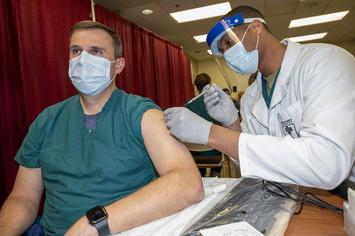
It’s well known by now that trust in American institutions has been in decline. Frankly, that’s in part deserved. It’s objectively the case, for example, that we responded far worse to the coronavirus than many other countries, most notably countries in East Asia.
While there’s little prospect of a quick recovery in broad-based trust, all leaders of institutions, public, private or non-profit, can at least try to rebuild and maintain credibility in their own domain.
Trustworthiness is baseline ethics and operational integrity. Completely eliminating corruption from government will never happen, and all human beings do bad things from time to time, so we should never expect totally clean government. But the coronavirus pandemic has revealed how often officials make unforced errors. A number of governors, mayors and other senior state and local officials flagrantly violated their own public health orders. These sorts of behaviors destroy public trust. We have to do much better than this. Public officials have shifted their stance on masks, first opposing them, then mandating them. There’s nothing wrong with changing course in volatile situations. We should expect that. But these changes have been poorly rolled out and poorly explained to the public.
Trust requires institutional competence. Simply put, that’s the ability to get things done. While there are valid reasons to criticize big tech, these companies have proven extremely competent. Amazon was able to expand and adjust to unprecedented demand during the pandemic. Apple’s products work as advertised. Google Maps does what I want it to.
Unfortunately, our public sector has not been able to address many problems so successfully. Problems that have become much worse recently, such as homelessness and crime, are extremely complicated to solve. But the public rightly expects government to be able to deliver. Vaccine distribution does not appear to the average person to be as inherently complex as crime. Yet we read reports of health-care workers forced to throw away vaccine doses or even being prosecuted for not doing so.
The need to execute more competently is only going to become more important as many more coronavirus-related bills come due. School districts, cities and states are going to have to engage in a massive effort to keep at-risk kids from having their lives permanently derailed as a result of educational disruption. For their sakes, we absolutely have to deliver.
Crucial to this task is missional focus – the sense that organizations are actually directing actions towards their most important goals. When college tuition levels and student loan costs soar, for example, while many people with college degrees remain underemployed, Americans are rightly beginning to ask what the mission of many colleges is, and whether or not a degree is even worth it. Our public health community has defined its mission so expansively, multiplying the number of items declared a public health crisis, that it’s legitimate to ask whether they took their eye off the ball on the spread of the coronavirus.
Who is getting it right on rebuilding trust? One good example is Mitch Daniels, the president of Purdue University. Daniels, the former governor of Indiana, took over Purdue in 2013. He immediately implemented a tuition freeze that’s now set to last at least a decade.
Read the rest of this piece at Governing.
Aaron M. Renn is an opinion-leading urban analyst, consultant, speaker and writer on a mission to help America’s cities and people thrive and find real success in the 21st century. He focuses on urban, economic development and infrastructure policy in the greater American Midwest. He also regularly contributes to and is cited by national and global media outlets, and his work has appeared in many publications, including the The Guardian, The New York Times and The Washington Post.
Photo credit: U.S. Secretary of Defense via Flickr under CC 2.0 License.












